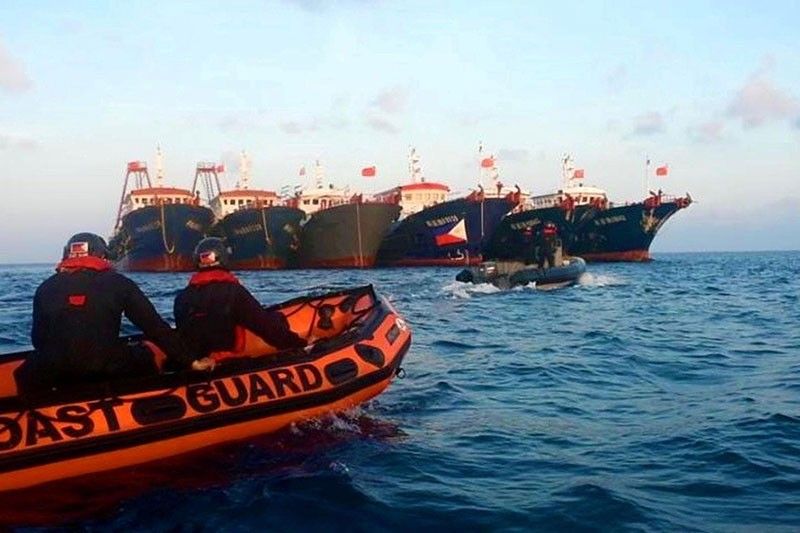Exposed: Slavery, poaching by Chinese fleets worldwide

Beijing rides roughshod not only in the South China Sea. Equipped and escorted by warships, its distant-water fishing fleets practice slavery in the Indian, Atlantic and Pacific Oceans.
Chinese coolies are awakened by clubbing, then forced to work 20 hours hauling up fishing nets. They’re lucky.
Foreign recruits suffer worse, The Economist reported April 13, 2024. On one Chinese trawler, eight Mozambicans slept on just two beds. On another there was no working toilet for Filipino and Indonesian crew, who had to defecate shipside for the months-long voyage. Anyone who complained was kicked, beaten or threatened with pay cuts.
London-based Environmental Justice Foundation identified 138 Chinese trawlers off Mozambique, Tanzania, Kenya and Madagascar in southwest Indian Ocean. EJF interviews with some crewmen exposed:
• Three in four interviewees said Chinese captains or recruiters confiscated their passports or birth certificates to prevent offboarding;
• Some, including Latin Americans, were trapped at sea for months or years;
• Four comrades died, one by suicide;
• The incidents occurred in 2017 to 2023;
• Maltreatment amounted to “modern slavery.”
International maritime charity Stella Maris UK confirmed the findings in The Economist, May 4. “We have intervened in many cases, including Kenya and South Africa, where fishing crews have been mistreated,” CEO Tim Hill wrote.
“Many of the exploited fishermen are breadwinners, simply trying to earn a living for themselves and families. The financial strain and psychological trauma they suffer can be devastating and long-lasting.”
Stella Maris rescued 16 desperate fishermen in Mombasa. Unscrupulous shipowners had left them famished and penniless.
In Cape Town a group of fishermen were found physically abused, denied of medical care, forced to wear torn protective clothing, deprived of food and water and not paid wages.
“Our team provided medicines and food,” Hill said. “Thankfully, the outcomes in these two cases were positive. There remain many that are not.”
China has 177 distant-water fishing fleets, its State Council Information Office brags. They run 2,551 ships – notorious worldwide for illegal, unreported, unregulated (IUU) fishing.
The Economist reported: “If sharks got entangled, they would hack off the fins, tossing the mutilated creatures back into the water to die. When dolphins were ensnared, the captain shot them, cut out their teeth and bartered them with passing ships for whisky.”

Again EJF elicited from interviews:
• Chinese crewmen regularly and deliberately killed protected species, such as turtles, dolphins and false killer whales;
• Eighty percent said they systematically engaged in shark finning even of endangered or critically endangered species;
• Chinese vessels routinely poached in waters close to the shoreline reserved by law for small-scale local fishers;
• Those in Mozambique even lined their nets with fine mesh, catching smaller fish usually targeted only by locals;
• They menaced local fishers, ripping their nets and driving them out of fishing grounds.
Chinese trawlers also poach in Africa’s Atlantic side. They drag nets in the exclusive economic zones and territorial waters of Gambia, Sierra Leone, Mauritania, Senegal, Guinea-Bissau and Guinea. Corrupt bureaucrats abet the displacement of small fishers.
Beijing claims to have “zero tolerance” towards IUU fishing. The opposite shows in the six west African countries where China flexes geopolitical muscle.
China enables abuses by its distant-water fleets, The Economist said:
“Vessels receive some $7 billion a year in government subsidies.” China’s navy escorts them, EJF added.
South America is not spared. On the Pacific side as many as 600 Chinese trawlers swarm Ecuador’s Galapagos EEZ every year.
Alarmed in 2020 about their marine ecosystems as well, neighbors Peru, Panama, Costa Rica and Colombia told them to leave. China’s embassy in Quito alibied that they were only sheltering from storm.
“Sheltering” has long been a Chinese lie. In 1992 it claimed that its fishers were merely sheltering from bad weather in the Philippines’ Panganiban (Mischief) Reef. By 1995 it had concreted the corals into an island fortress with missiles, helipads and wharfs.
China’s yearly trespass in Galapagos is well documented. Trawlers would illegally switch off automatic identification systems to elude satellite detection, then sail deep into the world-protected area.
Targets: hammerhead shark fins and other endangered species for serving in Hong Kong, Shanghai and Canton restaurants.
In the west Pacific, Chinese poach in tiny Palau and huge Indonesia. Both states confiscate and burn intruding trawlers onsite.
Thieves also enter Japan, Korea and Russia. In the Philippines, 2014-2024, they stole thousands of giant clams in Panatag (Scarborough) Shoal planted there by Filipino fisheries students in the 1970s. Shells six-feet long and three-feet wide are carved for ornaments.
* * *
Catch Sapol radio show, Saturdays, 8 to 10 a.m., dwIZ (882-AM).
Follow me on Facebook: https://tinyurl.com/Jarius-Bondoc
- Latest
- Trending



























